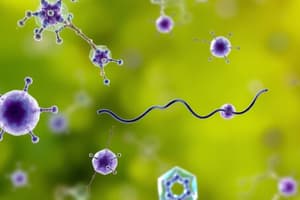Podcast
Questions and Answers
What are the main functions of proteins in living organisms?
What are the main functions of proteins in living organisms?
- Regulating metabolic pathways only
- Energy storage and biogeochemical cycles
- Storing and transferring genetic information
- Catalysis, structure, transport, and signaling (correct)
What is the primary purpose of carbohydrates in organisms?
What is the primary purpose of carbohydrates in organisms?
- Catalysis of biochemical reactions
- Energy sources and structural components (correct)
- Synthesis of nucleic acids
- Storage of genetic information
Which of the following accurately describes catabolism?
Which of the following accurately describes catabolism?
- Energy release through breakdown of molecules (correct)
- Synthesis of complex molecules from simpler ones
- Conversion of ATP into ADP and energy
- Absorption of nutrients for metabolic processes
What is the role of enzymes in biochemical reactions?
What is the role of enzymes in biochemical reactions?
During which stage of cellular respiration does the majority of ATP production occur?
During which stage of cellular respiration does the majority of ATP production occur?
What is the process of transcription in the context of gene expression?
What is the process of transcription in the context of gene expression?
Which technique is primarily used to amplify DNA sequences?
Which technique is primarily used to amplify DNA sequences?
What is the significance of understanding biochemical processes?
What is the significance of understanding biochemical processes?
Flashcards are hidden until you start studying
Study Notes
Key Concepts in Biochemistry
1. Definition
- Biochemistry is the study of chemical processes within and related to living organisms.
- It combines principles of both biology and chemistry.
2. Major Biomolecules
-
Proteins
- Composed of amino acids.
- Functions include catalysis (enzymes), structure, transport, and signaling.
-
Carbohydrates
- Sugars and starches.
- Serve as energy sources and structural components.
-
Lipids
- Fats, oils, and phospholipids.
- Important for energy storage, membrane structure, and signaling.
-
Nucleic Acids
- DNA and RNA.
- Store and transfer genetic information.
3. Metabolism
-
Catabolism
- Breakdown of molecules to release energy.
- Examples: glycolysis, Krebs cycle.
-
Anabolism
- Synthesis of complex molecules from simpler ones.
- Requires energy, e.g., protein synthesis.
4. Enzymes
- Biological catalysts that speed up chemical reactions.
- Lower activation energy and are highly specific.
- Factors affecting enzyme activity:
- Temperature
- pH
- Substrate concentration
- Inhibitors and activators
5. Cellular Respiration
- Process by which cells convert biochemical energy from nutrients into ATP.
- Stages:
- Glycolysis (cytoplasm)
- Krebs cycle (mitochondria)
- Electron transport chain (mitochondria)
6. DNA Replication and Protein Synthesis
-
DNA Replication
- Semi-conservative process; each strand serves as a template.
-
Transcription
- Synthesis of RNA from a DNA template.
-
Translation
- Synthesis of proteins from mRNA template by ribosomes.
7. Signal Transduction
- Mechanisms by which cells respond to external signals.
- Involves receptors, second messengers, and signaling pathways.
8. Techniques in Biochemistry
- Chromatography: Separation of biomolecules.
- Electrophoresis: Separation based on charge and size.
- Mass Spectrometry: Determining molecular weight and structure.
- PCR (Polymerase Chain Reaction): Amplifying DNA sequences.
9. Applications
- Medicine: Drug development and disease diagnostics.
- Biotechnology: Genetic engineering and synthetic biology.
- Environmental science: Bioremediation and biofuels.
10. Importance
- Understanding biochemical processes is crucial for advances in health, nutrition, and agriculture.
Definition
- Biochemistry integrates biology and chemistry to study chemical processes vital to living organisms.
Major Biomolecules
- Proteins
- Constructed from amino acids and serve essential functions such as catalysis, structural support, transport, and signaling.
- Carbohydrates
- Includes sugars and starches, primarily providing energy and serving as structural components.
- Lipids
- Consist of fats, oils, and phospholipids crucial for energy storage, membrane formation, and cell signaling.
- Nucleic Acids
- Comprise DNA and RNA, responsible for storing and transmitting genetic information.
Metabolism
- Catabolism
- The process of breaking down larger molecules to release energy, illustrated by pathways like glycolysis and the Krebs cycle.
- Anabolism
- The synthesis of complex molecules from simpler ones, often requiring energy input, such as in protein synthesis.
Enzymes
- Function as biological catalysts that accelerate chemical reactions by lowering the activation energy.
- Enzyme activity can be influenced by several factors, including temperature, pH, substrate concentration, and the presence of inhibitors or activators.
Cellular Respiration
- A vital process that converts biochemical energy from nutrients into ATP.
- Occurs in three main stages:
- Glycolysis in the cytoplasm.
- Krebs cycle in the mitochondria.
- Electron transport chain in the mitochondria.
DNA Replication and Protein Synthesis
- DNA Replication
- A semi-conservative mechanism where each original DNA strand becomes a template for a new strand.
- Transcription
- The process of synthesizing RNA from a DNA template, critical for gene expression.
- Translation
- The assembly of proteins using mRNA as a template, facilitated by ribosomes.
Signal Transduction
- Refers to the processes through which cells interpret external signals, involving receptors, second messengers, and complex signaling pathways.
Techniques in Biochemistry
- Chromatography
- A method for separating biomolecules based on their properties.
- Electrophoresis
- Technique for separating biomolecules by charge and size.
- Mass Spectrometry
- Utilized for determining the molecular weight and structure of compounds.
- PCR (Polymerase Chain Reaction)
- A powerful method for amplifying specific DNA sequences.
Applications
- Medicine
- Plays a significant role in drug development and diagnostics for diseases.
- Biotechnology
- Facilitates advancements in genetic engineering and synthetic biology practices.
- Environmental Science
- Utilized in bioremediation efforts and the development of biofuels.
Importance
- Understanding biochemical processes is essential for improvements in health, nutrition, and agricultural practices.
Studying That Suits You
Use AI to generate personalized quizzes and flashcards to suit your learning preferences.




